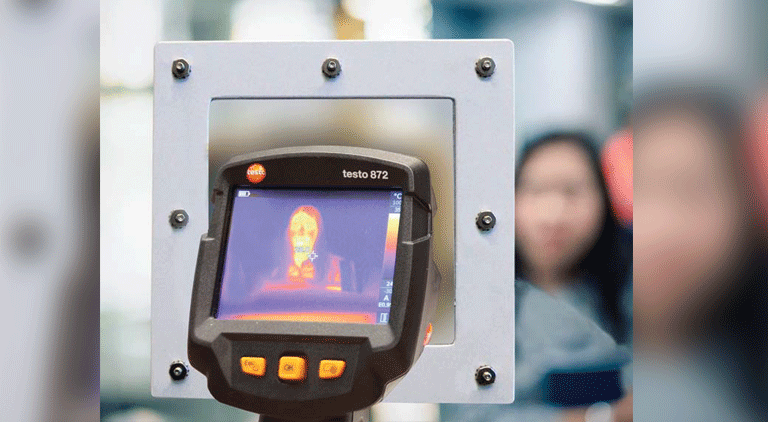Thermal scanning at workplace is must in COVID-19 scenario: A govt. mandate
By EPR Magazine Editorial June 30, 2020 5:23 pm IST
By EPR Magazine Editorial June 30, 2020 5:23 pm IST

Thermal imaging cameras allow non-contact measurement of body surface temperature and are proven to detect elevated skin temperatures brought by various external causes like COVID-19.
The wide spread threat of the pandemic has impacted industry operations to a great extent. A brief season of lockdown became a necessary protocol to be followed by everyone. But now when the situations are changing and the industry prepares itself to restart all operations, necessary precautions and proper care has to be taken to ensure the safety of all employees. The primary step that is advised for all workplaces includes the implementation of thermal scanning and fever detection techniques at the entrance of the facility. The Government of India’s Ministry of Health has also put forward a mandate for the provision for thermal scanning at all public spaces and organisations.
Testo India being the pioneers in testing and measurement instruments plays an important role in providing such mass scanning solutions, in the form of testo Thermal Imagers. These thermal imaging cameras allow non-contact measurement of body surface temperature and are proven to detect elevated skin temperatures brought by various external causes like COVID-19, this makes them non-invasive first step for febrile detection.
Thermal Cameras at work
Testo Thermal Cameras such as testo 890 has built-in fever detection mode and automatic face recognition feature that helps the user to conduct mass scanning of the people. They can be installed at the entrance of the premises over a tripod and a separate LED screen (connected to the instrument via HDMI cable) can be used as a bigger virtual screen to monitor the scan results of the people or can be manually handled by a person to inspect the entrants.
While in operation, the thermal imager will give hottest temperature when FOV (field of view) of the camera/lens covers minimum a face of the person. Generally, temperature of retina or inner canthus of eye (corner of the eye where the upper and lower eyelids meet) which is near to (not exactly) core body temperature is measured. While screening, the surface temperature of the skin is recorded and an alarm is triggered if it exceeds a certain threshold value (approximately equal to or above 99.5 deg F). This allows those with an elevated body surface temperature to be identified quickly and easily. They can be isolated from others and further medical investigations are carried out.
Thermal scanning guidelines and key points
It is necessary for the person conducting thermal scanning to know about the process, procedure and application of the equipment. However, if someone is determined to use technology with no experience, no training and without right kind of product he is expected to get false and wrong results. Another necessary point to understand about this method is that the thermal imaging cameras can only detect, measure and document the variations of skin surface temperatures and does not define if someone is sick or healthy. These ultimate diagnostics decision can only be taken by medical healthcare professional using a fever thermometer on people detected with escalated body temperatures.
There are some necessary points that must be kept in mind while conducting the thermal scan, like for example the person under scan, in front of the camera should have
Similarly while using Thermal camera there are basic requirements that needs to be ensured regarding the equipment such as;
Testo range of instruments for thermal scanning
Safety comes with responsibility
Implementation of thermal inspection looks the need of the hour and therefore it becomes the responsibility of facility management, decision makers, transportation authorities, regional and Public Health Care and security authorities, institutional heads, HSC officer of production plant etc to ensure the health and safety of the public, colleagues and other associates.
For more details, visit:
www.testo.com or contact on: info@testo.in
We use cookies to personalize your experience. By continuing to visit this website you agree to our Terms & Conditions, Privacy Policy and Cookie Policy.